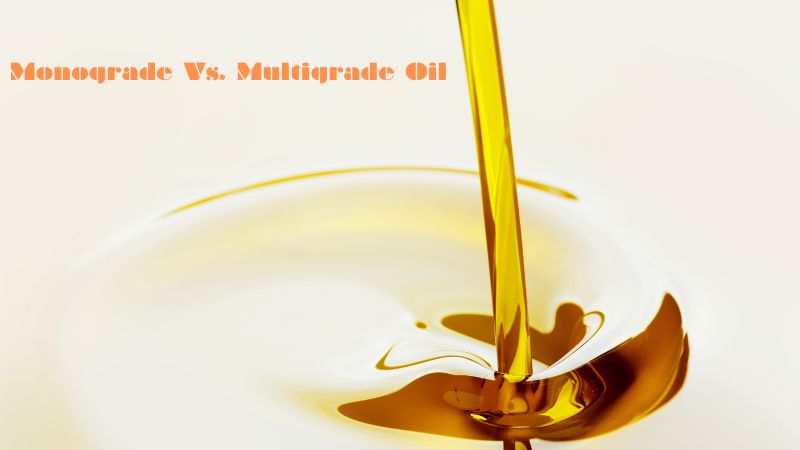Monograde and multigrade are two types of motor oil viscosity. But you may wonder what’s the difference between monograde vs. multigrade oil.
The monograde engine oil viscosity is defined only at 100°C. The multigrade engine oil viscosity is specified at 100°C and shallow temperatures such as (-) 25°C.
Additionally, monograde oils are best for moderate and stable climates, whereas multigrade perform well in a significant change in the ambient environment.
A temperature change significantly changes the viscosity of the monograde. In contrast, multigrade does not alter the oil’s viscosity very much. Let’s discuss the difference between monograde and multigrade oil in detail.

What is Monograde Oil?
The meaning of monograde oil is it has only one SAE viscosity grade. And it is defined by the SAE J300 standard. Usually, it is meant for hot or cold applications only. SAE J300 has an eleven viscosity grade; six are winter grades and are provided a “W” designation.
Monogrades generally fall under two categories:
Grades with “W”: Monograde oils are winter-grade oils ideal for cold temperatures or cold starts. For example, 5W, 10W, 15W, and 20W. Grades without “W”: These are summer oils with viscosity grades perfect for warmer temperatures—for example, SAE 30, 40, and 50.
The dynamic viscosity is measured at various cold temperatures for single winter-grade oils, relying on the viscosity grade. And it’s specified in J300 in units of mPa/s.
The oil is graded based on the coldest temperature the oil is at, as SAE viscosity grade 0W, 5W, 10W, 15W, 20W, or 25W. The lower the viscosity grade, the lower the oil temperature.
For example, if an oil passes specifications for 10W and 5W but fails for 0W, you must label the oil as SAE 5W. Typically, it won’t be labeled as 0W or 10W.
What Is Multigrade Oil?
Unlike monograde oils, it can cover a single requirement set by the SAE J300 classification system. Multigrade oils fulfill the needs of multiple SAE grades. Therefore it may be more suitable for use over a border temperature range than monograde oils.
This oil is made by adding a viscosity index improver with low-viscosity oil. The viscosity index improver is an additive and can improve oil’s viscosity characteristics. These additive oils combine thin oils and have good starting and friction properties at low temperatures.
Difference Between Monograde Vs. Multigrade Oil:
Viscosity refers to how much fluid can resist the force that allows it to flow—monograde oil in a reasonably pure state motor oil. The name comes from the fact that it has only one grade of substance, the oil itself.
Since oil’s viscosity varies based on temperature, it will flow more efficiently at high temperatures than at low temperatures. In contrast, multigrade oils have many specific additives. So it keeps the oil viscosity reasonably constant regardless of temperature.
For example, SAE 10W-30 is a multigrade oil. Regardless of the oil temperature, it gives an engine a reasonably usable viscosity level. Although it becomes fragile at extreme temperatures, otherwise it will not present a problem for vehicles.
Monograde Oil Advantages And Disadvantages:
Using monograde oil has many advantages and disadvantages. Let’s discuss it below.
Monograde Oil Advantages:
- Oil viscosity has been stable for a long time
- Slow oil aging
- Monograde oil does not require low temperatures.
- Hence, they thicken faster than multigrade oils as the temperature decreases.
- As the temperature increases, they thin out uniformly throughout the temperature range.
Monograde Oil Disadvantages:
- Viscosity has strong temperature dependence
- It does not allow good lubrication over a wide temperature range.
- Excellent lubricating characteristics for cold or heat
- They can only work effectively over a small temperature range.
Multigrade Oil Advantages and Disadvantages:
Like all oils, multigrade oil has advantages and disadvantages. Have a look:
Advantages of Multigrade Oil:
- An oil for year-round use
- Improved low-temperature starting
- Wonderful high-temperature performance
- Excellent overall fuel economy – less idle time and faster warm-up
- Low battery drain on cold start
- Fast, full-pressure lubrication over a wide temperature range
Disadvantages of Multigrade Oils:
- A badly worn engine can leak low-temperature oil
- Polymer shearing can happen under high stress and shock load conditions.
What Oil Is Better?
In the southern country, it’s best to use monograde oil in the summer. On the other hand, in winter, it’s suitable to use in multigrade oil. But if you live in the north, it’s best to use multigrade oil for maximum time. During the hot summer months, it’s recommended to use monograde oil.
Changing the oil at least three times a year is one of the two most important things you can do to keep your engine safe. Second? Make sure your oil temperature is around 180°F on a cruise.
Monograde Oil For Motorcycle:
Accordingly, monograde oil is suitable for a very narrow temperature range. SAE monograde oils generally fall into two main categories. Grades with a ‘w’ after them (SAE 5w, 10w, 15w, and 20w) are only suitable for winter use. They are generally thinner oils better for winter use or cold starts. ‘Summer’ grades (SAE 20, 30, 40, and 50) are more suitable for warm temperatures.
For example, an SAE 10w oil is thin, which is good for cold starts. But as the temperature rises, it becomes too narrow for adequate lubrication. When monograde oil SAE 40 is relatively thick, it provides good lubrication if the engine is warm.
Final Word:
Every modern car user likes to use Multigrade oil for their modern engine. Multigrade oil can handle components in the ultimate viscosity range, offering compatible response and lubrication protection.
Monograde oil is an adequate alternative if the component gives excellent oil cooling and immediate temperature control. However, this is the guide where we describe monograde vs. multigrade very well. After reading this article, you will get the correct information you want.

